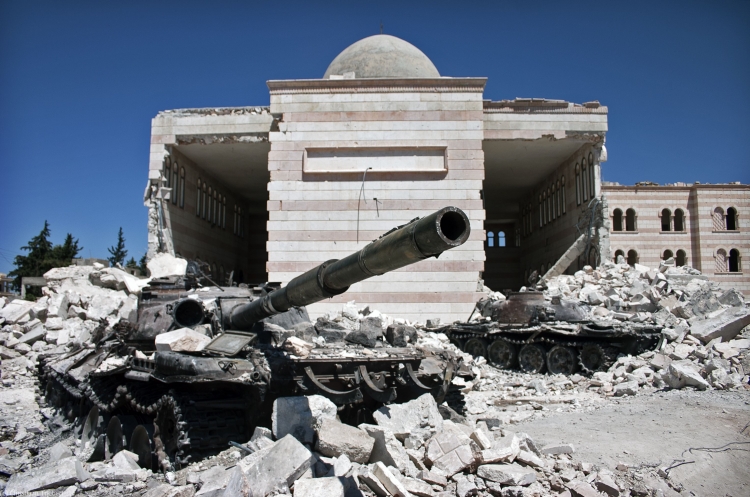As Syrian Civil War Grows More Violent, Tensions Rise Between East and West

Why is there a war in Syria?
President Bashar al-Assad drew many complaints from his people over a lack of political freedom, corruption, and unemployment. They started to fight this state of repression around March 2011, around the same time that the Arab Spring inspired pro-democracy demonstrations in Daraa (southwestern Syria), according to the BBC. However, the government used "deadly force" to stop this uprising, which caused nationwide protests calling for al-Assad to resign. Sadly, this only led to more violence. Protesters had to take up arms to defend themselves and then to later try to get the security forces out of their towns. Violence escalated even more from there, and many rebel groups formed against the government to wrestle for control of Syria. This led to a civil war, and five years later it's still happening.
It's not just about the government versus the rebels anymore, though. World powers like Russia, Saudi Arabia, the US and Iran have all intervened in support for one side or the other. Their support led to even more conflict, helping to lengthen the war. Along with the issue of support, the external forces are accused of turning the Sunni majority against the Shi'a government and making this a religious conflict too.
Jihadist groups took the plunge and joined the war as well, trying to gain control of Syria for themselves. They're fighting the rebels, the government, Kurdish forces, the US-backed forces and Russian air strikes.
Key players in the war:
President al-Assad: In control of the Syrian Armed Forces. Using extreme acts of violence in hopes of "stabilizing" the country. Fighting against the rebels, IS, the Kurds, and the US.
[His Allies:]
Russia: Putin launched an air campaign in 2015, stating that only terrorist groups would be targeted. However, the air strikes mainly hit Western-backed rebel groups.
Iran: Largely Shi'a like al-Assad's government. Al-Assad is Iran's closest Arab ally and Iran uses Syria as the main transit point for shipments of weapons to Hezbollah (Lebanese Shi'a Islamist movement).
[Those Opposed:]
Syrian Rebels: Sunni majority fighting against al-Assad's repressive government to acquire more human rights.
United States: Says al-Assad is responsible and must step down. Has only supplied limited military assistance to "moderate" rebels. Fears advanced weapons getting into the hands of Jihadists. Has been conducting air strikes on IS, but avoiding attacking government forces. Doesn't want to get too involved.
Kurdish Forces: Troops on the ground, helping the rebels in the war in northern Syria.
Turkey: Supporting the rebels, but trying to ban the US from supporting the Kurdish forces on the ground. (Accused the US of supporting the banned Turkish Kurdistan Worker's Party).
Saudi Arabia: Sunni-ruled, attempting to counter the influence of Iran. Military and financial assistance to the rebels.
[Other:]
Islamic State (AKA ISIL, IS, Daesh): Minority population, Jihadist movement. Sees violence as a political instrument and necessity if it will restore balance and God's rule on Earth. Using shocking forms of killing, e.g. recording and posting the videos, to build fear and draw attention.
Image Credit: Wikimedia Commons
What's Happening Now?
Just recently, Russian warships requested to dock in the Spanish port of Ceuta (North coast of Africa) while on their way to Syria through the Mediterranean. They requested to refuel there, sparking concerns from NATO, an ally of Spain. NATO was worried that the warships would be used to bomb civilians and urged Spain to deny their request. It was such a big deal that BBC News even said, "Western leaders have said Russian and Syrian air strikes on Aleppo could amount to war crimes, an accusation rejected by Russia." Later, the BBC posted that Russia accepted the withdrawal, giving no information as to why they accepted it.
While many people have joined in on the fighting in Syria, the Middle East has once again become a battleground for more powerful countries in the East and West to fight on. There have been air raids from both the US and Russia, but civilians have been the ones largely affected. Hospitals and schools are bombed while the countries claim that they are only bombing armies or "terrorists", which isn't a great solution either, but that's another story. Because of NATO's fear of and the United States' opposition to Russia, the West has a relatively clear anti-Russia stance during this war. Russia wants to come back into a role of power, and it possibly can if the Syrian government wins the war with Russia's help.
Some people consider this war to be a proxy war between the US and Russia that started when Russia began to bomb Syria in support of al-Assad. Obama and Putin can't agree to even discuss the issue, so there is only anger and fighting on both sides. Following this year's US election we will see if there is any change in these discussions, especially considering Donald Trump and Vladimir Putin's friendship. Trump also claimed here that "Hillary Clinton's foreign policy plan in Syria would trigger World War III." She wanted to create a no-fly zone over Syria, which could worsen tensions with Russia, while Trump wants to focus on defeating IS rather than removing al-Assad. Trump seems to be repeating many of Putin's plans for Syria, which have little to do with providing any humanitarian aid. With the election of Trump and a predominantly Republican senate, the world will soon see which direction both the United States and the civil war is headed.
Will this Syrian Civil War turn into Cold War II? One can only wait to see and hope for the best.
Image Credit: The Kremlin









